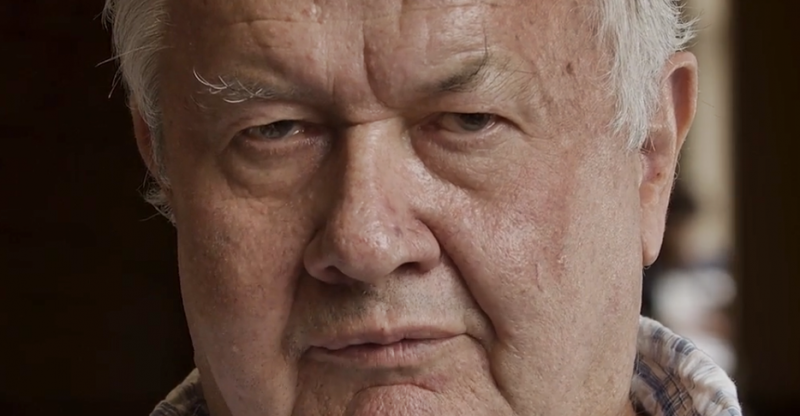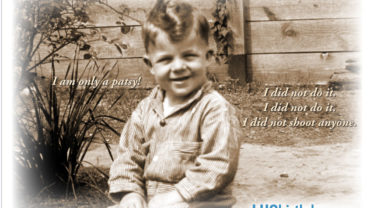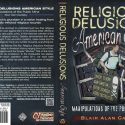The Journey 45. Phillip Nelson: LBJ’s Bloody Hands
Phillip Nelson discusses his book, “Remember the Liberty: Almost Sunk by Treason on the High Seas,” with publisher Kris Millegan. LBJ’s treason – ordering an attack on an American ship, the USS Liberty, and the nuclear bombing on Cairo, to help him politically in 1967. Luckily, that bombing, and a plausible consequence, World War III with the Soviet Union, did not happen.
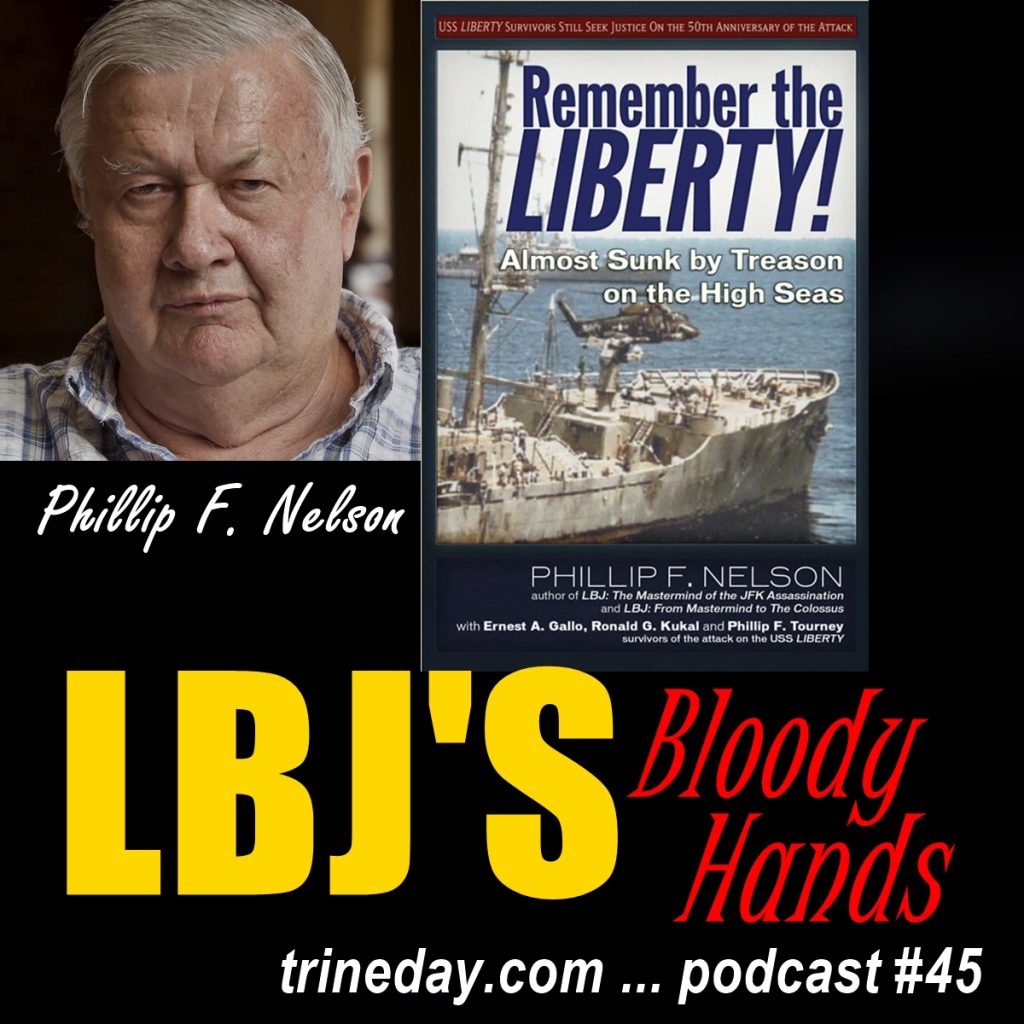
K: I kind of remember the attack [in 1967] but it didn’t really affect my life.
P: That story was squashed almost as soon as it happened. A few stories appeared but they were filled with errors. I think the “San Francisco Chronicle” said that there were four killed and 50 injured. It was actually thirty-four men killed, and a hundred and seventy-four injured. Greater than 200 casualties on a ship that carried 294 people. So the vast majority of the crew were somehow incapacitated or killed. President Johnson made sure that story was just going to be killed immediately and the cover-up began immediately and the cover-up continues today.
K: How did you get the survivors to help write the book?
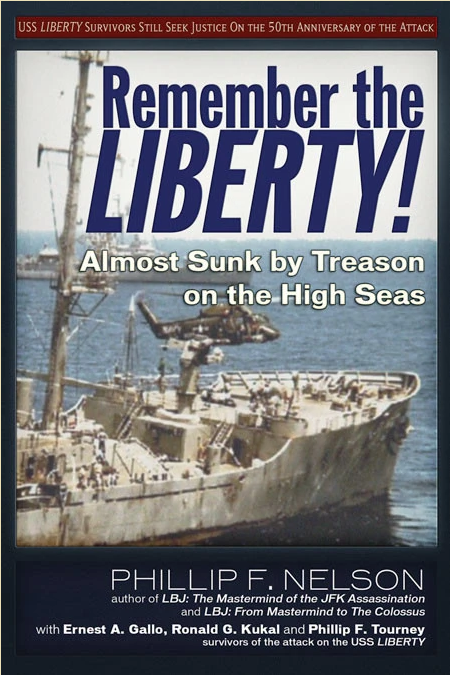
P: I sent free copies of “LBJ: From Mastermind to The Colossus,” which has two chapters about the attack on the Liberty, to any survivor who wished to have it. About twenty-five or thirty. Three of them accepted my suggestion that we do a book together, to get their stories. Those stories comprise close to half of the book. Those are very compelling, very sobering, very profound stories about what they experienced and the sheer treachery that they had to endure. Not just during the attack, but in the subsequent hours after that, because it took about 18 hours for any help to arrive. Which is very strange. The Sixth Fleet, in the Mediterranean, was only 10 minutes away by fighter jet.
K: Give us the thumbnail description of the Liberty incident.
P: The Liberty was put there for that very purpose. They were in the Mediterranean, south of Italy, on June 5th when Israel’s Six-Day War suddenly started. Late June 7, they arrived in the eastern Mediterranean, just off the Sinai. The next morning, June 8, they began operations. It was an intelligence ship, sent there to monitor all of the radio traffic that was going on. Suddenly there were 12 to 13 overflights by Israeli aircraft, and then they attacked the ship with cannons and missiles. Then they dropped napalm (jellied gasoline) on the ship and set the decks on fire. The ship’s communications were jammed. But they found a way to send a distress call. And that wasn’t part of the plan. That was not supposed to happen. When the jets went away, the motor torpedo boats entered the scene. They fired four torpedoes at the Liberty, all of which missed. And that begs a huge question: How could all four miss when there was nothing to prevent them from getting as close as possible to guarantee that they didn’t miss.
One survivor needed to use an investigator to prove that he was on the Liberty, to get his benefits, because the Navy was denying it. And the investigator found that there was a fifth torpedo that was not an Israeli torpedo. It was fired by the USS Amberjack. Meaning, Johnson had one of his ships shoot a torpedo at another one of his ships in order to seal the deal and sink the Liberty so that he could then attack his enemy, Egypt’s president Gamal Abdel Nasser – that is, bomb Cairo – and there were a couple of A-4s that were armed with nuclear bombs, headed for Cairo, and they were only a few minutes out when they were called back [after the Liberty started sending out SOSes].
K: Can you talk about Johnson’s history of using these type of events in his looking to get elected?
P: The biggest was back in 1964 with the Gulf of Tonkin … it was amazing … this false-flag operation, an attack that never really happened … was so convincing that almost the entire Congress was convinced that it had happened.
K: So the posit is that the Liberty incident happened because Lyndon Johnson was using it as an election ploy.
P: That’s exactly right. Realizing how well it worked in 1964, when he was elected with a landslide victory – of course, there were a lot of other factors going on – in 1967, he knew he was in serious trouble. And he thought that he could do anything. If the ship would have sunk, he would have attacked Cairo, even though it risked World War III, because by then Egypt had become more closely associated with the Soviet Union. The Soviet Union had military ships in the same area. Had there been such an attack [on Cairo], there would have been an immediate response by the Soviet Union. Somehow, the fact that the Liberty didn’t sink avoided that. Because America had recalled all the aircraft. Johnson was so psychotic [during the attack on the Liberty], he said, “I want that goddamn ship going to the bottom. No help. Recall the wings.” I think some of the leadership of the IDF, the Israeli Defense Forces, at least one, maybe a couple of generals, or admirals, who I think were apoplectic that this was all going on, [intervened]. They all knew that it was really an American ship, even though they denied it later and said it was an Egyptian ship. But it had to be someone’s choice that those four torpedoes did not hit that ship.
K: Cynical blood politics. Most people won’t even go there, to think that someone would do something like that and use the blood of our own citizens to help themselves get elected.





